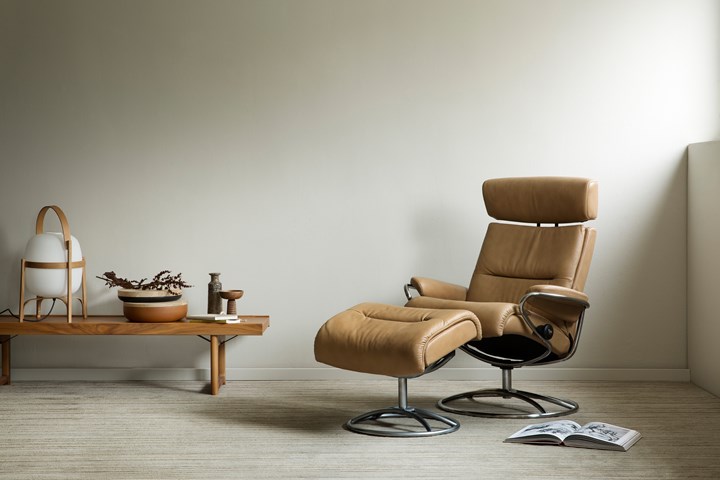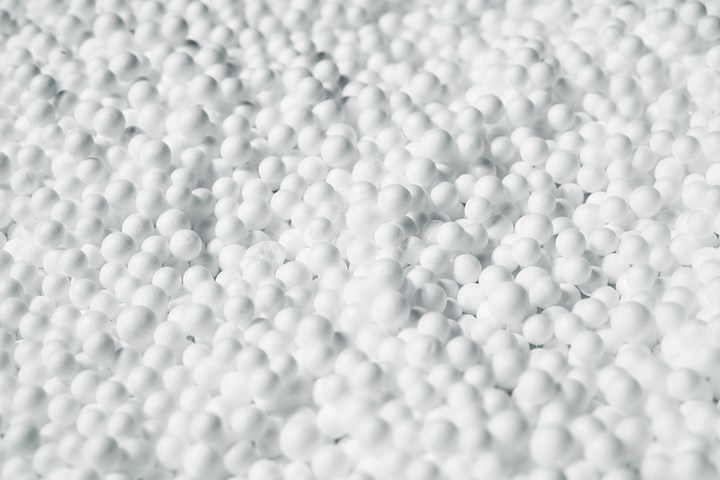Chemically Recycled EPS Packaging Used by High-End Design Furniture Maker
BASF’s Styropor Ccycled used by Ekornes for its Stressless furniture brand.
While we don’t often report on expandable polystyrene (EPS) bead foam, it is interesting that this material---often vilified as being “unrecyclable”—is being made, in part, with chemically recycled PS and now being commercially used by Ekornes, a Norwegian manufacturer of high-end design furniture. Ekorne’s use of BASF’s Styropor Ccycled EPS represents the first project in Scandinavia that contributes to the sustainability strategy of all companies by using protection packaging based on chemically recycled plastic waste.

As of November 2021, Ekornes, uses EPS protective packaging that has a lower carbon footprint than virgin material by safeguarding the same properties. This is achieved by replacing fossil resources with recycled raw materials at the beginning of production. BASF supplies Styropor Ccycled to Vartdal Plast, who converts the material into molded packaging parts for Ekornes’ Stressless furniture brand.
Due to its manufacturing process, Styropor Ccycled reportedly has the same properties as conventional Styropor. This maintains the excellent packaging properties such as outstanding impact absorption and high compressive strength, which are essential for the protection of sophisticated design furniture. In the production of the packaging foams that have become so well-known over the last 70 years, pyrolysis oil replaces fossil raw materials.
BASF sources this oil from technology partners who use a thermochemical process called pyrolysis to transform post-consumer plastic waste that would otherwise be used for energy recovery or go to landfill into this secondary raw material. BASF then uses the oil at the very beginning of the value chain to manufacture new plastics and other products. Since recycled and fossil raw materials are mixed in production and cannot be distinguished from each other, the recycled portion is allocated to Styropor Ccycled using a mass balance approach. Both the allocation process and the product itself, have been certified by an independent auditor. Compared with conventional Styropor, at least 50% of CO2 is saved in the production of Styropor Ccycled.
As for Vartdal Plast, Styropor Ccycled brings a lot of advantages as the product is identical to virgin material. Therefore, the production process does not have to be adjusted. The company and their products are certified according to the ecoloop certification programme, confirming that for the products, 100 % recycled material was used as feedstock. Said Vartdal Plast product manager Mounir El'Mourabit, “We are thrilled to be working together with BASF and Ekornes on this project. This is a testament of our mutual commitment towards a more sustainable future.”

Said head of BASF’s Styrenics business in Europe Klaus Ries, “Current environmental policy focuses on reducing greenhouse gas emissions, conserving fossil resources, and avoiding or using waste. By using products from our ChemCycling project, our partner Ekornes is actively contributing to the recovery of plastics after their use phase and feeding them back into the materials loop,”
Related Content
-
Processing Megatrends Drive New Product Developments at NPE2024
It’s all about sustainability and the circular economy, and it will be on display in Orlando across all the major processes. But there will be plenty to see in automation, AI and machine learning as well.
-
Foam-Core Multilayer Blow Molding: How It’s Done
Learn here how to take advantage of new lightweighting and recycle utilization opportunities in consumer packaging, thanks to a collaboration of leaders in microcellular foaming and multilayer head design.
-
Recycled Material Prices Show Stability Heading into 2023
After summer's steep drop, most prices leveled off in the second half.















